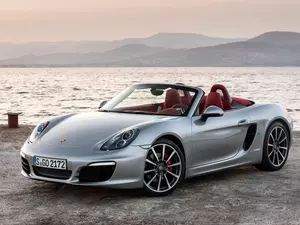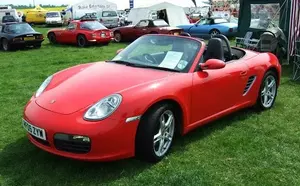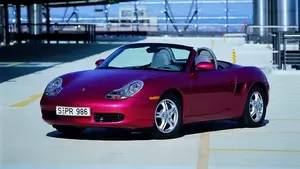
| Vehicle | Curb weight | Difference from world's smallest | Weight to power ratio | 0—60 mph acceleration ratio | Consumption ratio |
|---|---|---|---|---|---|
| 2.7 |
1360 kg / 2999 lbs |
935 kg (2062 lbs) heavier | 5 kg to 1 hp | 252 kg/s (556 lbs/s) |
172 kg/L (379 lbs/L) |
| S 3.4 |
1370 kg / 3021 lbs |
945 kg (2084 lbs) heavier | 4 kg to 1 hp | 285 kg/s (628 lbs/s) |
167 kg/L (368 lbs/L) |
| GTS 3.4 |
1375 kg / 3032 lbs |
950 kg (2095 lbs) heavier | 4 kg to 1 hp | 293 kg/s (646 lbs/s) |
168 kg/L (370 lbs/L) |
| Vehicle | 2.7 |
|---|---|
| Curb weight |
1360 kg / 2999 lbs |
| Difference from world's smallest | 935 kg (935 lbs) heavier |
| Weight to power ratio | 5 kg to 1 hp |
| 0—60 mph acceleration ratio | 252 kg/s (556 lbs/s) |
| Consumption ratio |
172 kg/L (379 lbs/L) |
| Vehicle | S 3.4 |
| Curb weight |
1370 kg / 3021 lbs |
| Difference from world's smallest | 945 kg (945 lbs) heavier |
| Weight to power ratio | 4 kg to 1 hp |
| 0—60 mph acceleration ratio | 285 kg/s (628 lbs/s) |
| Consumption ratio |
167 kg/L (368 lbs/L) |
| Vehicle | GTS 3.4 |
| Curb weight |
1375 kg / 3032 lbs |
| Difference from world's smallest | 950 kg (950 lbs) heavier |
| Weight to power ratio | 4 kg to 1 hp |
| 0—60 mph acceleration ratio | 293 kg/s (646 lbs/s) |
| Consumption ratio |
168 kg/L (370 lbs/L) |

| Vehicle | Curb weight | Difference from world's smallest | Weight to power ratio | 0—60 mph acceleration ratio | Consumption ratio |
|---|---|---|---|---|---|
| 2.7i Boxter Automatic |
1365 kg / 3010 lbs |
940 kg (2073 lbs) heavier | 6 kg to 1 hp | 204 kg/s (450 lbs/s) |
131 kg/L (289 lbs/L) |
| 2.7i Boxter MT |
1295 kg / 2855 lbs |
870 kg (1918 lbs) heavier | 5 kg to 1 hp | 219 kg/s (483 lbs/s) |
135 kg/L (298 lbs/L) |
| 3.2 Boxter S MT |
1345 kg / 2966 lbs |
920 kg (2029 lbs) heavier | 5 kg to 1 hp | 259 kg/s (571 lbs/s) |
129 kg/L (284 lbs/L) |
| 3.2 Boxter S Automatic |
1385 kg / 3054 lbs |
960 kg (2117 lbs) heavier | 5 kg to 1 hp | 231 kg/s (509 lbs/s) |
126 kg/L (278 lbs/L) |
| 3.4 Boxter S Automatic |
1395 kg / 3076 lbs |
970 kg (2139 lbs) heavier | 5 kg to 1 hp | 241 kg/s (531 lbs/s) |
127 kg/L (280 lbs/L) |
| 3.4 Boxter S MT |
1345 kg / 2966 lbs |
920 kg (2029 lbs) heavier | 5 kg to 1 hp | 264 kg/s (582 lbs/s) |
127 kg/L (280 lbs/L) |
| Vehicle | 2.7i Boxter Automatic |
|---|---|
| Curb weight |
1365 kg / 3010 lbs |
| Difference from world's smallest | 940 kg (940 lbs) heavier |
| Weight to power ratio | 6 kg to 1 hp |
| 0—60 mph acceleration ratio | 204 kg/s (450 lbs/s) |
| Consumption ratio |
131 kg/L (289 lbs/L) |
| Vehicle | 2.7i Boxter MT |
| Curb weight |
1295 kg / 2855 lbs |
| Difference from world's smallest | 870 kg (870 lbs) heavier |
| Weight to power ratio | 5 kg to 1 hp |
| 0—60 mph acceleration ratio | 219 kg/s (483 lbs/s) |
| Consumption ratio |
135 kg/L (298 lbs/L) |
| Vehicle | 3.2 Boxter S MT |
| Curb weight |
1345 kg / 2966 lbs |
| Difference from world's smallest | 920 kg (920 lbs) heavier |
| Weight to power ratio | 5 kg to 1 hp |
| 0—60 mph acceleration ratio | 259 kg/s (571 lbs/s) |
| Consumption ratio |
129 kg/L (284 lbs/L) |
| Vehicle | 3.2 Boxter S Automatic |
| Curb weight |
1385 kg / 3054 lbs |
| Difference from world's smallest | 960 kg (960 lbs) heavier |
| Weight to power ratio | 5 kg to 1 hp |
| 0—60 mph acceleration ratio | 231 kg/s (509 lbs/s) |
| Consumption ratio |
126 kg/L (278 lbs/L) |
| Vehicle | 3.4 Boxter S Automatic |
| Curb weight |
1395 kg / 3076 lbs |
| Difference from world's smallest | 970 kg (970 lbs) heavier |
| Weight to power ratio | 5 kg to 1 hp |
| 0—60 mph acceleration ratio | 241 kg/s (531 lbs/s) |
| Consumption ratio |
127 kg/L (280 lbs/L) |
| Vehicle | 3.4 Boxter S MT |
| Curb weight |
1345 kg / 2966 lbs |
| Difference from world's smallest | 920 kg (920 lbs) heavier |
| Weight to power ratio | 5 kg to 1 hp |
| 0—60 mph acceleration ratio | 264 kg/s (582 lbs/s) |
| Consumption ratio |
127 kg/L (280 lbs/L) |

| Vehicle | Curb weight | Difference from world's smallest | Weight to power ratio | 0—60 mph acceleration ratio | Consumption ratio |
|---|---|---|---|---|---|
| 3.2 Boxer S 24V |
1370 kg / 3021 lbs |
945 kg (2084 lbs) heavier | 5 kg to 1 hp | 245 kg/s (540 lbs/s) |
128 kg/L (282 lbs/L) |
| 2.5 Boxer 24V |
1250 kg / 2756 lbs |
825 kg (1819 lbs) heavier | 6 kg to 1 hp | 189 kg/s (417 lbs/s) | - |
| 2.7 Boxer 24V |
1335 kg / 2944 lbs |
910 kg (2007 lbs) heavier | 6 kg to 1 hp | 212 kg/s (467 lbs/s) |
135 kg/L (298 lbs/L) |
| 2.7 Boxter 24V |
1275 kg / 2811 lbs |
850 kg (1874 lbs) heavier | 6 kg to 1 hp | 209 kg/s (461 lbs/s) |
131 kg/L (289 lbs/L) |
| 3.2 Boxter S 24V |
1320 kg / 2911 lbs |
895 kg (1974 lbs) heavier | 5 kg to 1 hp | 244 kg/s (538 lbs/s) | - |
| Vehicle | 3.2 Boxer S 24V |
|---|---|
| Curb weight |
1370 kg / 3021 lbs |
| Difference from world's smallest | 945 kg (945 lbs) heavier |
| Weight to power ratio | 5 kg to 1 hp |
| 0—60 mph acceleration ratio | 245 kg/s (540 lbs/s) |
| Consumption ratio |
128 kg/L (282 lbs/L) |
| Vehicle | 2.5 Boxer 24V |
| Curb weight |
1250 kg / 2756 lbs |
| Difference from world's smallest | 825 kg (825 lbs) heavier |
| Weight to power ratio | 6 kg to 1 hp |
| 0—60 mph acceleration ratio | 189 kg/s (417 lbs/s) |
| Consumption ratio | - |
| Vehicle | 2.7 Boxer 24V |
| Curb weight |
1335 kg / 2944 lbs |
| Difference from world's smallest | 910 kg (910 lbs) heavier |
| Weight to power ratio | 6 kg to 1 hp |
| 0—60 mph acceleration ratio | 212 kg/s (467 lbs/s) |
| Consumption ratio |
135 kg/L (298 lbs/L) |
| Vehicle | 2.7 Boxter 24V |
| Curb weight |
1275 kg / 2811 lbs |
| Difference from world's smallest | 850 kg (850 lbs) heavier |
| Weight to power ratio | 6 kg to 1 hp |
| 0—60 mph acceleration ratio | 209 kg/s (461 lbs/s) |
| Consumption ratio |
131 kg/L (289 lbs/L) |
| Vehicle | 3.2 Boxter S 24V |
| Curb weight |
1320 kg / 2911 lbs |
| Difference from world's smallest | 895 kg (895 lbs) heavier |
| Weight to power ratio | 5 kg to 1 hp |
| 0—60 mph acceleration ratio | 244 kg/s (538 lbs/s) |
| Consumption ratio | - |